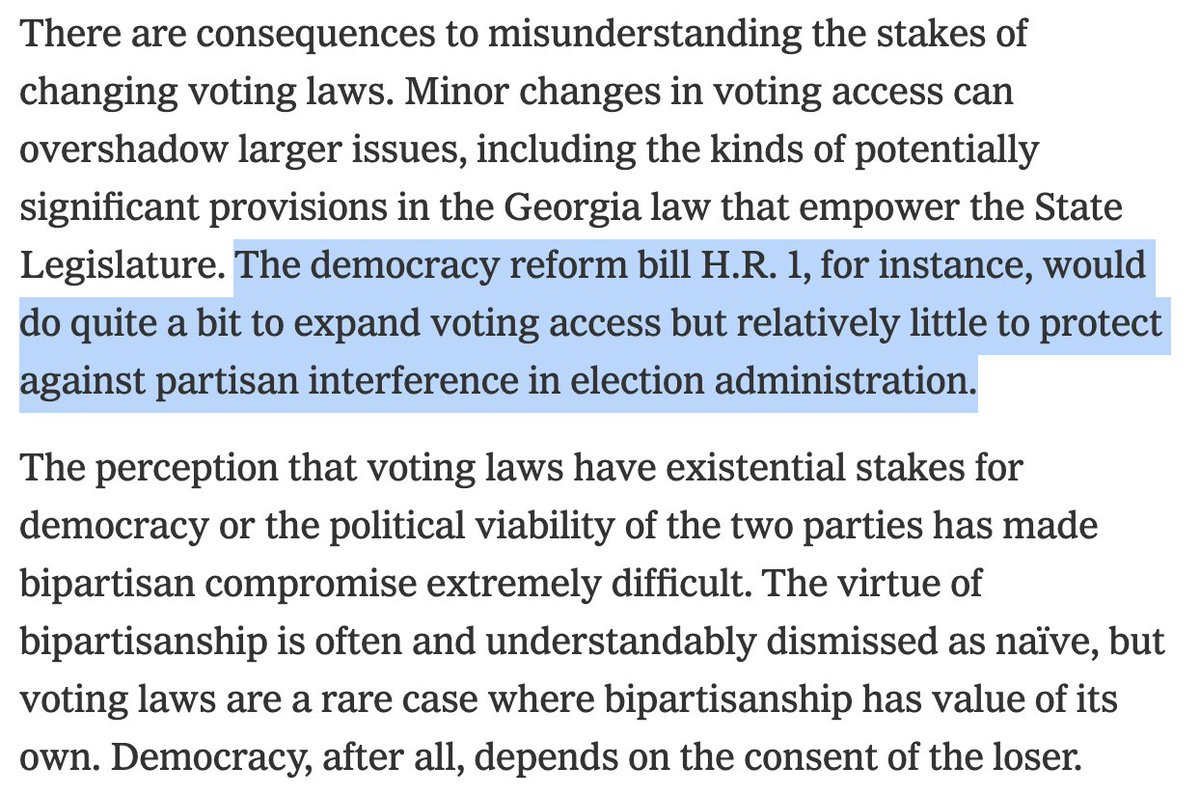
The Georgia election law's restrictions on voting are unlikely to discernibly affect turnout or the result
nytimes.com/2021/04/03/ups…
nytimes.com/2021/04/03/ups…
I've limited my analysis to the provisions affecting whether and how people can vote, not those that empower the state legislature to play a larger role in election administration. More on those later, but those provisions don't inherently affect voting access in a particular way
I also like to say that I do think it's important for journalists to report about the consequences of these laws, not just their intent or morality, for a few reasons.
For starters, many political actors are operating under--and even motivated by--the erroneous assumption that these laws have existential stakes for electoral outcomes. That has real world consequences.
After all, part of why these laws are being pushed is because they think they'll do something!
Conversely, the reform bill HR1 has no chance to find bipartisan support so long as people really believe it could doom the Republican Party (it would not).
Similarly, if you want to protect democracy--and make sure HR1 does--you do need to be able to prioritize, and distinguish nuisances from fundamental threats.
In the worst case, reformers could overlook more severe but less self-evidently morally repugnant threats
In the worst case, reformers could overlook more severe but less self-evidently morally repugnant threats

As an aside: after several days of hoping to have clear sense about whether or how the state legislature could abuse this law by usurping administrative powers, I did not come up with a clear and satisfactory answer.
I do think there are a lot of possible powers that could be abused (yes, this risk already existed to be clear). But I don't think anyone has fully thought through either the extent that these powers could be misused--or what you could really get away if you tried
Could a partisan GA administrator, even in 2020, have successfully 'found' the 11k votes, through decertification or eligibility challenges, and survived court challenge? I don't think the answer is absolutely certain.
I actually agree with virtually every single thing in this thread.
(But for context, my focus on advance/no-excuse abs voting is a reflection of the GA law, which restricts no-excuse absentee voting without touching things we agree do matter, like autoreg)
(But for context, my focus on advance/no-excuse abs voting is a reflection of the GA law, which restricts no-excuse absentee voting without touching things we agree do matter, like autoreg)
https://twitter.com/hill_charlotte/status/1378411340193177601?s=20
Voter reg is so important because it effects who *can* vote: if you aren't registered, you *can't* vote.
In that sense, tough voter reg laws actually are kind of reminiscent of Jim Crow, which also targeted who *can* vote (can't pay poll tax? you *can't* vote)
In that sense, tough voter reg laws actually are kind of reminiscent of Jim Crow, which also targeted who *can* vote (can't pay poll tax? you *can't* vote)
In contrast, the GA law provisions on voting mainly effect *how* you can vote.
And while restrictions on "how" can amount to disenfranchisement (imagine one site per state!), the balance of research suggests that if you can vote, you'll figure out how in typical circumstances
And while restrictions on "how" can amount to disenfranchisement (imagine one site per state!), the balance of research suggests that if you can vote, you'll figure out how in typical circumstances
• • •
Missing some Tweet in this thread? You can try to
force a refresh



